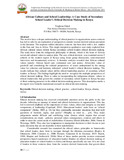African Culture and School Leadership: A Case Study of Secondary School Leader’s Ethical Decision Making in Kenya
Abstract
The need to have a deeper understanding of ethical practice in organizations across contexts
has led to calls for an exploration of perspectives outside western derived notions prevalent
in the literature. The response within education contexts has been slow with a few studies
in the East and less in Africa. This single interpretive qualitative case study explored how
African cultural values inform Kenya secondary school leaders ethical decision making.
The study drew from the indigenous philosophy of ubuntu, which is the heart of African
social and cultural values to analyse data. The case, ethical decision was examined across 5
schools in the western region of Kenya using focus group discussions, semi-structured
interviews and documentary reviews. A thematic analysis revealed that African cultural
values namely: African based care, communal care and justice, Afrocentric value of
goodwill and considering the cultural perspectives of issues underpinned by the strong
value for cohesion and harmony informed school leader’s ethical decision making. The
results indicate that cultural values define ethical leadership practice of secondary school
leaders in Kenya. The findings highlight the need to recognize the multiple perspectives of
ethical decision making. There is value in incorporating the indigenous ubuntu values in
ethical frameworks that govern the conduct of secondary school leaders in Kenya because
of their enduring presence in the ethical decision-making process. This description marks a
divergent view from the mainstream research on ethical decision making.

